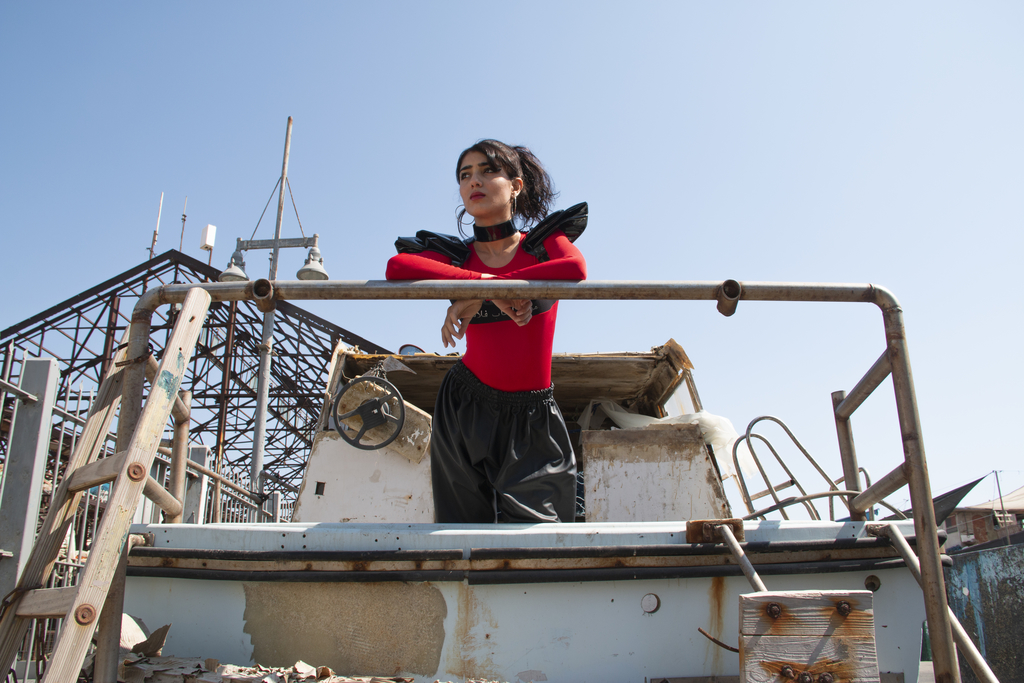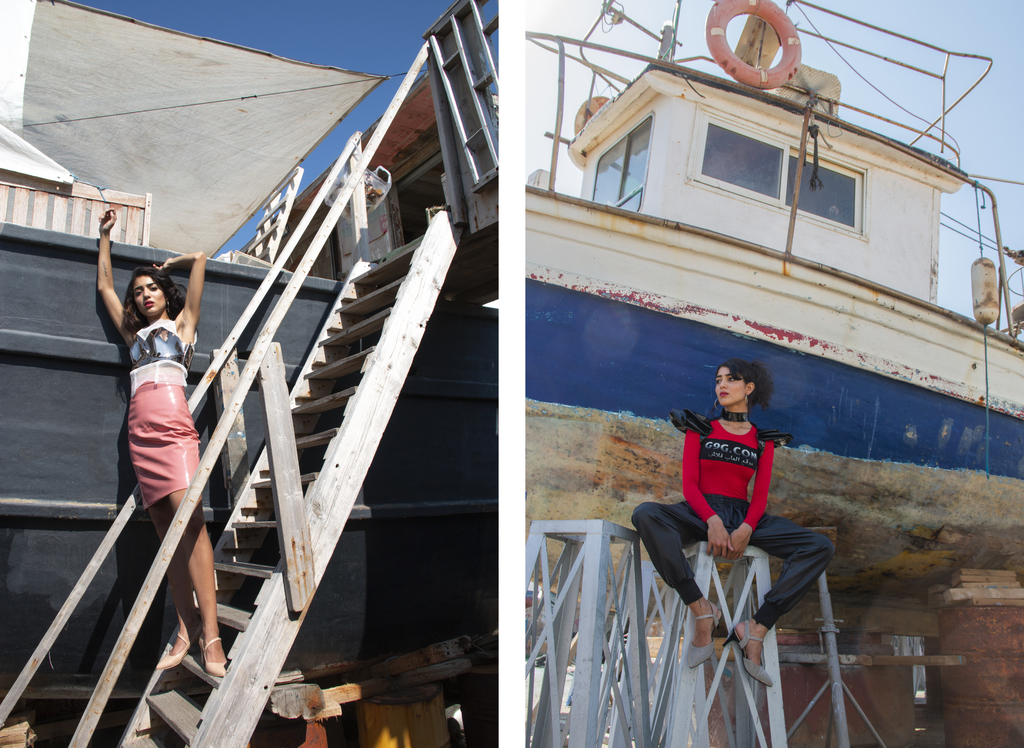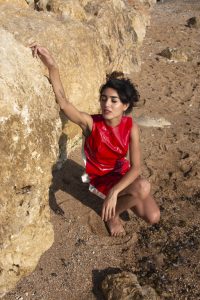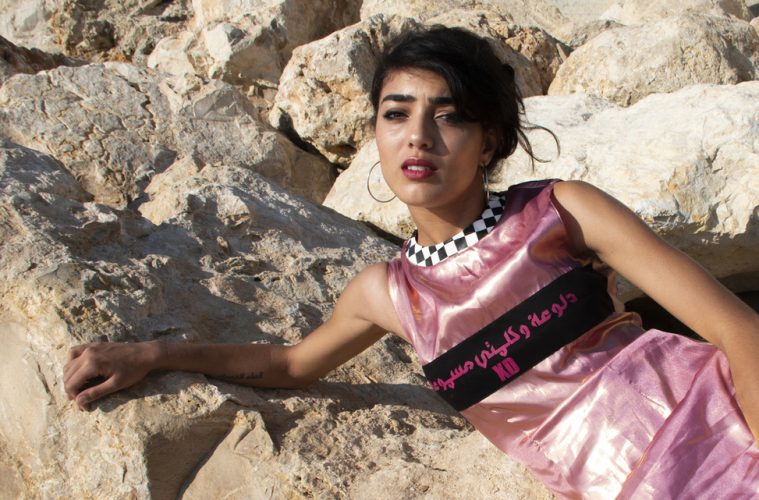Interview and Photography by Shukri Lawrence
Copy Edited by Eliza Marks
Makeup by Reem Kawasmi
Styling by tRASHY
Palestinian actress, Yara Elham Jarrar, was born and raised in Yaffa, Palestine, and currently plays the rebelious main character, Salma, in the first fully Palestinian produced web series ‘Salma w Sari سلمى و سري’. Yara uses her voice as an actress to express different sides of herself and to communicate relatable stories and mindsets, taking roles that she connects with and believes in.
Yara’s love for the arts started at a young age, when she first performed in front of a crowd at the age of six during a school performance. She loved the energy that the audience transferred to performers and the adrenaline of being on stage, which eventually pushed her to pursue acting as a career.
But, for Yara, acting was about more than just adrenaline. She played a variety of roles growing up, but made sure that she could “see herself” in the characters. Yara said that, “Actors have a responsibility to represent their communities with their voices, so if I play a stereotypical role that I do not believe represents my community I’d be selling out and there wouldn’t be a reason for pursuing the art of acting. I have the responsibility of showing my people in their realest form and not in the false ideologies put upon us.”
It is no surprise, then, that Yara likes to analyze scripts and discuss the characters with directors and writers, as a way to fight what she believes in. She noted that, “The most common roles Arab women get are usually terrorists or oppressed characters. I go to these auditions just to argue with the director/writer and leave. Although it’s not my role to do so, I still feel the responsibility to correct the context and the way my people are portrayed in film and television. I feel the need to tell the directors and writers about the false stereotypes”. Being cast as a ‘terrorist’ is an ongoing problem that many Palestinian actors encounter when looking for work.

All clothes by worn by tRASHY
Fed up with the cycle of auditioning for roles and declining them because of their message, Yara was in need of a role that she could legitimately relate to. She found such a role in the first fully Palestinian-produced web series, Salma w Sari, a creative drama show for social change. Yara noted how inspiring the production of the show was, saying,“It’s been amazing to work with the cast and crew of the series. Having everyone come from different cities like Yaffa, Jerusalem, Ramallah, Nazareth, and Golan, it has been so beautiful to interact with the different people with different accents and backgrounds.”
Yara also appreciated the commitment people are putting into such a low budget project, sometimes working for 20 hours straight. She said, “It was also amazing to see the effort the cast has put in making the series happen. Imagine one makeup artist doing makeup for more than 10 characters for a scene, or two girls working on the costumes/sets for the 30 episodes in 3 months. It has been inspiring to work with the crew on something we all considered refreshing and new to Palestinian culture.”

All clothes by worn by tRASHY
Salma w Sari was produced by ARTLAB and OXFAM and is categorized as “edutainment,” educating through entertainment. The writers began by doing research in Jerusalem, asking communities about the issues they face and what they would like to see discussed in the show. Suggested topics including pressures of marriage, gender roles, artistic career choices and the love lives of Palestinian youth, where then folded into the narratives of the show and embodied in different characters, so that elements were not only relatable but recognizable for Jerusalemites.
Responses to the show have been very positive, and especially to Yara’s character, Salma, who wants to pursue a career in the arts but is pressured to get married at a young age. Yara said that many girls have reached out to her about how they connect with Salma, and feel like they face similar issues of marriage, assault and harassment, and other social pressures. Yara herself said, “I see myself in Salma… her passion for wanting to pursue a career in photography is the same passion I have in acting and performing, a career not so common in our society.”

All clothes by worn by tRASHY
Yara has recently left Yaffa and moved to Ramallah. She said,“It’s been hard living in Yaffa, with the occupation being in my face 24/7. Every time I looked at the sea view from Yaffa and saw the massive buildings of Tel Aviv I felt depressed… I paid off my debts, left them a middle finger, and moved to Ramallah.” Palestinians living in ‘48 are expected to adapt to Israeli society with work and daily life. Yara felt like she needed to surround herself with people who were more like her. She said,“I love how kind we are as people, Arabs have the warmest hearts. We care for each other and welcome everyone with open arms,” and then joked, “Maybe that’s why we got occupied!”
Working in Yaffa was difficult, to say the least. “I love Yaffa a lot, but when I was a waitress in a restaurant there, I once had to serve an IDF soldier during the 2014 war, and he kept talking about how he killed ‘terrorists’, and I couldn’t say anything, I felt like a slave, and I wasn’t able to sleep at night. In Ramallah I hear my language, I see my people all around me.” Yara referenced a line she wrote, “‘I’d rather see them once a night rather than ten times a day.’”
Yara also DJs her own parties called ‘Hip Hop Nights,’ usually held in Ramallah. Her sets vary from local to international hip hop music, from throwbacks to new up-and-coming Palestinian sounds. “I love Hip Hop. As a Palestinian I feel a connection with the genre because of its context. I think Palestinians love rap because it is a way of resisting racism and expressing beliefs in their own underground cultures. There’s so much rawness in the lyrics and beats that make me feel like I need to make other people hear it at the party.”
To grow up with a few relatable voices to look up to in pop culture and media can be confusing for youth, but Yara has definitely turned into that relatable voice that Jerusalemite and other Palestinian youth can relate and connect to. Putting past roles behind her, Yara will keep using her voice to express her own truth in 2020. With new projects including a feature film, the thriller series, Possessions, with Canal+, a one-woman theatre show, and two feature films, ‘Holy Mother’ directed by Hussein Hossam and ‘Blacklisted’ directed by Mohammed Al Mughanni. As for now, Yara will keep fighting for that voice that she herself looked for when she was young.

